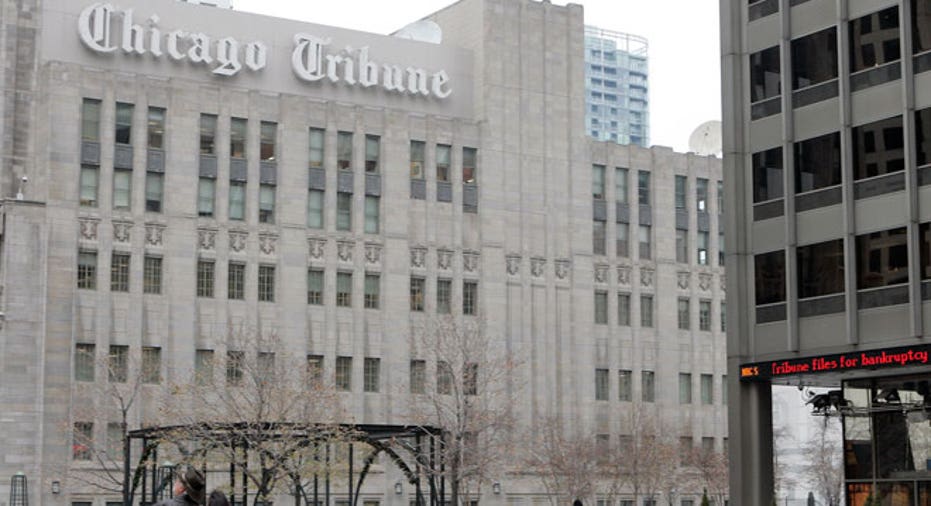Will the Tribune Split Be a Success for the Newspaper Business?

Following in the wake of companies like Time Warner and News Corp., the Tribune Company is officially spinning off its newspaper business on Monday.
The new company, Tribune Publishing, will begin trading on the NYSE on Tuesday under the ticker symbol TPUB, and includes newspapers such as The Los Angeles Times, Chicago Tribune, Sun Sentinel and The Hartford Courant.
“Three is a trend, and this is now solidly a trend,” said Rebecca Lieb, an analyst with the Altimeter Group, referring to the Time Warner (NYSE:TWX) and News Corp. (NASDAQ:NWSA) spinoffs. Also joining the pack are Journal Communications Inc. and E.W. Scripps Co., which announced last week that they would be combining their broadcasting businesses and spinning off their newspapers into a separate public company.
The splits allow media companies to jettison struggling newspapers and focus solely on the more-profitable broadcasting business.
“The lagging revenue of print divisions are bringing down revenue of overall media companies, and are therefore reflecting on their stock price,” said Lieb.
But the spinoffs don’t necessarily mean that newspapers are being left to die a slow and quiet death. Some analysts, including Lieb, say the splits could actually save the publishing industry, by allowing for a greater focus on the specific problems facing print journalism.
“When a print division is the only division that senior management needs to worry about and there aren’t bigger, more profitable distractions, more attention can be paid to solving these not at all easy to solve problems,” explained Lieb.
The biggest problem, of course, is the decline in newspaper advertising, which has hit even the nation’s top papers. The New York Times Co., (NYSE:NYT) for instance, reported last week that its Q2 advertising revenue dropped 4.1% versus the previous year. Earlier this year, the Newspaper Association of America (NAA)published a report saying that traditional print advertising fell 8.6% in 2013 to $17.3 billion.
The decline in advertising has put pressure on newspaper companies to increase circulation prices and create new revenue opportunities on the digital side.
“If you go back to 2007 and look at the newspaper revenue pie, about 80% of revenue came from advertising and 16% came from circulation and 3% was other,” said NAA VP of Research and Industry Analysis Jim Conaghan. “Last year, 46% of revenue came from advertising in printed papers and 29% came from circulation, and other portions grew to 8%.”
With that said, newspaper industry analyst Ed Atorino of the Benchmark Company isn’t overly optimistic.
“There’s always hope for periods of success here and there … but it’s hard to fight the tide, and newspaper advertising has not increased for a long time,” said Atorino.
TPUB’s Prospects
Despite this, Atorino said Tribune Publishing chief executive Jack Griffin is certainly up for the challenge of tackling his company’s major issues. Griffin has had a long career in both magazines and newspaper, though his management style was publicly criticized by Time Warner CEO Jeff Bewkes while he was at Time Inc. Griffin was eventually fired from his position as Time Inc. CEO.
“I know Jack well, and he’s an excellent executive who’s moved up the [ladder] to head Meredith Publishing Group. Now, he’s at a much bigger company doing newspapers, but he’s a talented guy who did well fighting the magazine battle, believe it or not,” said Atorino.
And in general, Spin-Off Research principal Joe Cornell, who does institutional research on spinoffs, said most spinoff companies do better once they’re on their own. Cornell points to the Bloomberg Spinoff Index, which has produced a return of 520.7% since its inception in December 2002, versus 119% for the S&P 500 in the same time frame.
“In the near term, the next three or four months, there may be a distribution in shares as investors make the decision whether to continue to own the publishing assets,” said Cornell, “so I don’t think [TPUB] will light the world on fire in the short term.”
With that said, Cornell is optimistic about the publishing business’s prospects in a year or two. “They’ll go from being the redheaded stepchild begging for money and attention to now getting to run in their own best interests,” said Cornell.



















